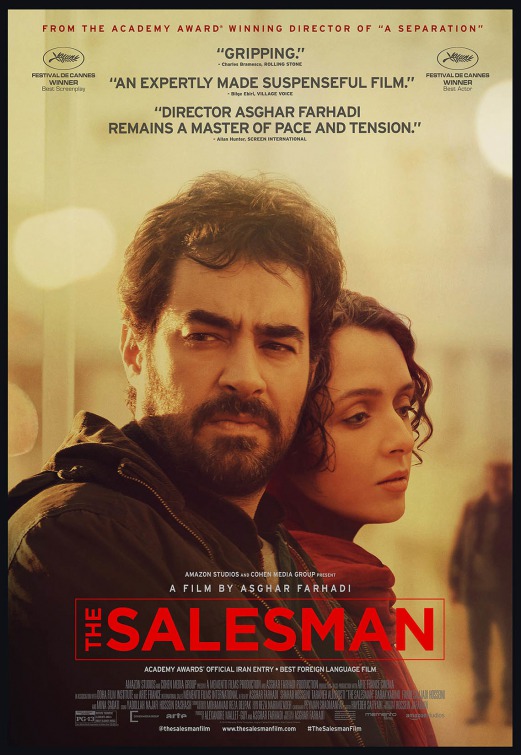In the hands of a less measured, less disciplined director, The Salesman might have descended into an obtuse melodrama of primal human emotions. But with Iranian auteur Asghar Farhadi at the helm, The Salesman is a thorough examination of a marriage at breaking point.
The film opens with still images of a production of Arthur Miller’s opus, Death of a Salesman, in which husband and wife Emad (Shahab Hosseini) and Rana (Taraneh Alidoosti) play Willy and Linda Loman. At first, the couple appear nothing like their characters – Emad is a popular schoolteacher, and Rana a spirited, intelligent actress.
A once secure relationship falters when Emad and Rana’s apartment block threatens to collapse. The inauspicious event results in their relocation to a flat owned by Babak (Babak Karimi), a fellow thespian. We soon find out his previous tenant was a “woman with many acquaintances.” One of those acquaintances, seeking the unknown tenant, enters the flat and injures Rana in the shower. She had left the door open, expecting Emad at any moment.
Rana sustains a wound to the head. After the incident, she retreats into her shell. Emad is infuriated; disempowered. In order to recapture his masculine pride, he embarks on a vigilante-style pursuit of her attacker: taking note of blood stains on the staircase and an abandoned pickup van. He eventually encounters the attacker in a prolonged showdown that couldn’t be more different than the pulpy Death Wish or the grandiose Gladiator.
Although The Salesman is no exercise in overcooked drama, that isn’t to say Farhadi’s film is devoid of suspense. Indeed, the final act of The Salesman is mired in it. Tension is a primary weapon in Farhadi’s expansive cinematic arsenal; manifested by his precise manipulation of character and understanding of the impulses that drive human thought and behaviour.
The widespread fascination with Farhadi’s work – from Fireworks Wednesday, to A Separation, to The Salesman – derives from his preoccupation with universal truths of domestic human existence: the rigid social and gender structures that prevail, the implosive nature of familial breakdown, and the struggle for individual expression amid overwhelming pressures.
In The Salesman, these themes are anchored in modern Iran, where Emad feels he must wreak vengeance, and Rana must not confide in anyone about the origins of her injury. The shaping of universal ideas by the Iranian context gives the The Salesman an important thematic and ideological precision.
It should come as no surprise that Farhadi has a Masters in Stage Direction, as much of the film is framed in dramatic terms: the overt metaphor of the decaying apartment block, the meticulous staging of action, and the parallel narrative of Death of a Salesman. Such use of the dramatic gives the film an immediate and emotional resonance that invigorates the core of The Salesman.
Ending with everything simultaneously said and unsaid, The Salesman is a towering work about the schisms of gender, of the stability that belies fragility.
The Salesman is in limited release.
